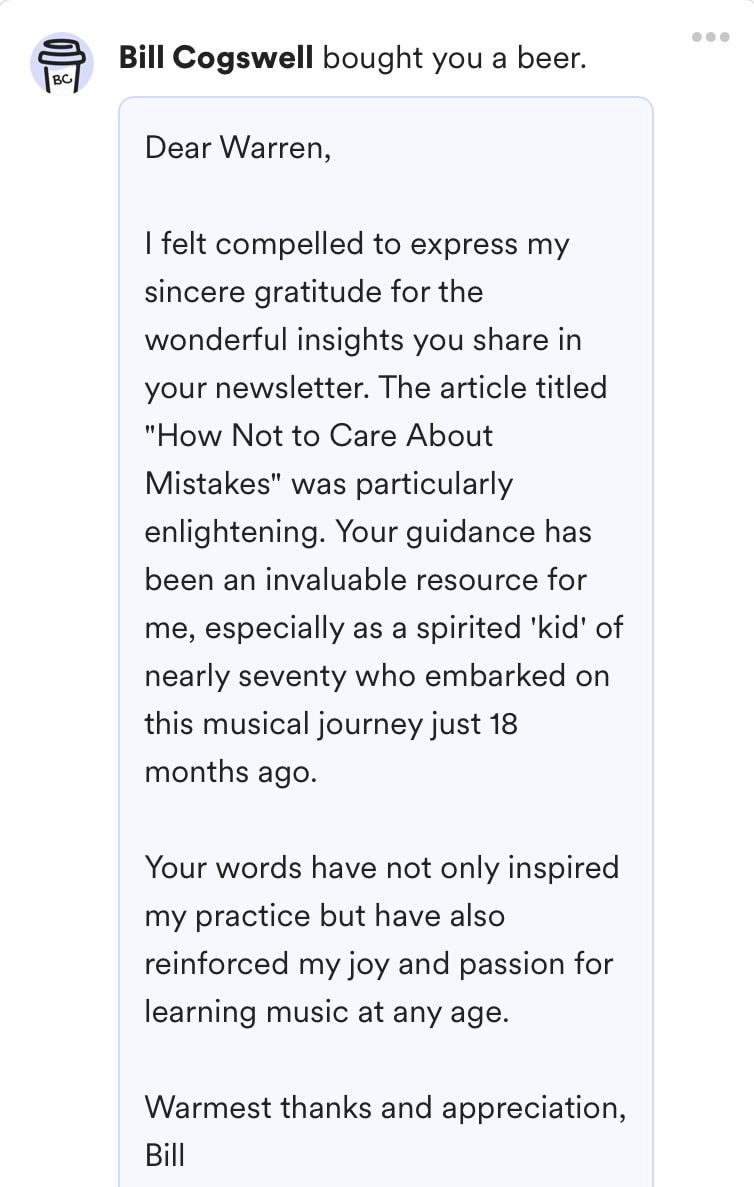Life is a Paradox
The more you chase something, the further it gets away from you.
To be productive, start with the hardest task ... or easiest one. The less you care about your upcoming recital performance ... the better you'll do. Ever notice how life is chockfull of contradictions? With so much contrary advice, how do you discern what to listen to? Here's the answer: both sides of the coin are true. Life is a marathon and a sprint. Yet we have a really hard time believing this because we want permanence - things to stay the same. Mainstream advice is full of this stuff. Do what you're passionate about. No pain no gain. Just work hard for 10 years and you'll succeed. Simple truths. But it rarely works out that way, just practicing as hard as possible doesn't mean you'll get as good as you want. And unfortunately a lot of people stick to this script and end up wasting years of their life (like me). Echo Chamber of One It happens because of confirmation bias - we look for signs we're doing something correctly, instead of questioning what we're doing wrong. What's so dangerous about this type of thinking? It's because whatever you look for you'll find it. You'll see evidence everywhere that supports your viewpoint even when it's not there. A story from my college years: There was usually one, important event my piano colleagues looked forward to after each of our solo recitals - the reception. It was a sacred tradition - anyone who dared to not feed their audience would risk ostracism. Anyways, my wife noticed that there was one particular non-piano major (even musicians have their cliques) who attended every piano recital. Whatever the word for free-loader is in Chinese, that's what she called him. But I told her to hold that thought. Maybe it's true, maybe it's not - you never know what a person's going through. And hey, at least he was there at the very beginning of each concert (instead of showing up for the last half). Fast forward a few years, we saw his photo prominently displayed ... on the cover of our college newspaper. This young man managed to graduate at the top of his class, while being homeless - at times he had to resort to sleeping in the school's practice rooms! Then it dawned on us - he had been coming to the receptions because that might have been his only meal for the day. Like I mentioned, you never know what a person is going through. By the way, I am no saint. There has been many a time where my wife has been the rational one while I have jumped to conclusions. I still have a better track record though (do not tell her). Taoism So how do you keep from jumping to conclusions? First, get outside opinions as frequently as possible. Solicit advice from people whenever you can. If you don't do this, it means you're only considering your own viewpoint. But be selective with your sources - don't get coding advice from a florist. What will most likely happen is you'll find people who agree with your idea and people who don't. And if their opinions are roughly split down the middle, you can weigh all the options and go with your gut. This is the balance you're looking for. But let's say you've recorded a performance of yourself and 9 out of 10 people think it's not too hot. In this scenario, it's safe to go with the consensus. However, it's not always going to map out this way, you'll intuitively learn when to trust yourself or the group. Second, set deadlines (while experimenting as much as possible). The biggest mistake of my life, one you'll do well to avoid, was spending too much time on one thing without looking at the results. Since then, I've adopted a 90-day rule: whatever goals I have, I sit down every 3 months to analyze my progress. So whatever goals you have with piano, make sure you have clear, measurable metrics to make judgments with. Look at the data objectively because the tape doesn't lie. What Goes Up Must Come Down Now, here's one last way to safeguard against confirmation bias. It's a secret weapon I use to avoid overconfidence and negative expectations. Whatever happens, I imagine the opposite. This tactic works because it allows you to eliminate assumptions by expecting the unexpected. It continues our theme of balance - keeping yourself going too far in one direction or the other. If you have a successful consultation with a new client, tell yourself it probably didn't work out and they won't sign up. No matter how long you've been teaching a student, there's always a possibility they can quit at any time without prior warning. But remember this also helps for when you're down and out. For example, when it comes to piano performances I somehow always manage to underestimate myself. The performance is never as bad as I imagine and I have to remind myself the result is going to be better than I think. So take this concept and apply to areas where you know you should be more confident about your skills. And this contrarian mindset is especially handy for the most menacing situation of all - success. Success is treacherous because it causes most people to fail (see: confirmation bias). I've done this many a time in my life. When business was booming, I had a full studio and my finances were looking great. Then ... BOOM! Something terrible would cut me down to size, I lost students I got cocky or I wasn't as good with numbers as I initially thought (I've learned to budget since then). Nothing makes you fail like success. So realize that staying successful is the end goal - that's when all the hard work begins. Most of it has to do with keeping your ego in check. I hope you enjoyed today read. If you learned something today, leave a comment or connect with me on social media.
Fin
Bagatelle Late last Tuesday night I received this notification. My first donation! To Bill: words cannot express how much gratitude I feel - both for your gift and your kind words. Seriously, I've been on cloud nine this entire week. So thank you Bill, I wish nothing but success on your journey. Kudos to you for sticking with it for 18 months, at nearly 70 years young no less! You're a true inspiration and I hope you update me on your progress in the near future. Happy Practicing!
P.S. I've got even more exciting stuff to share with you next week, stay tuned!
Life is a Paradox
Did you enjoy reading this today?

Your donation helps me create free content. Every dollar goes a long way! =)
0 Comments
How to Handle Mistakes
When I was a grade-schooler, I was scared to death of bringing home anything less than an A.
And at my first job, I remember witnessing one of the most magnificently stunning acts of anger in my life: my KFC (Kentucky Fried Chicken) manager violently slamming a bag of flour against the wall and repeatedly kicking it. To be fair, it was totally my fault. But I couldn't help imagining my face as a substitute-target for his foot - I quit that job immediately afterwards. These were two experiences that taught me that failure was not to be tolerated. Perfection was the expectation. But what my traditional, conservative Korean parents and my needs-an-anger- management class boss didn't realize is that mistakes are part of the process. Misconception Why do mistakes get such a bad wrap? It's because of:
This all has to do with identifying mistakes, and failure, with our very being. It's an awful way to take things as personally as possible. And it's just about the worst thing you can do, starts you on a negative, downward spiral. This negative ramifications start to bleed out into your professional and personal life. You start to make (incorrect) assumptions, which is deadly for the people you interact with. You start to think your client is late on payment because they don't respect you, your students aren't practicing because they're undisciplined, your spouse is purposely trying to get on your nerves. Jumping to conclusions is the fastest way to permanently damage your relationships - a total loss of emotional control. Look, we're supposed to be emotional. We have good days, we have bad days - it's part of the human experience. But you're not supposed to flip out, lest someone record you with their smartphone and you become the next meme on the internet. It turns into a game where you're one step away from ruining your life - a game where everyone loses. Correct Perception So how do you fix this broken narrative? You do this by:
When you do this, you create a culture where failures are the expectation and not the exception. Take it a step further and celebrate them. By doing this, you send the message that this is a place where you will not be judged. And by eliminating judgment, you create an environment of acceptance. Look, I'm no fool. It's not like I'm happy with every mistake a student makes. But first, work on the generals and leave the particulars for later. It's because the older I get, the more fun I want to have (life is short). And that's the experience I want every student to have. The world has become so friggin' boring and serious, there's enough of that misery to go around. Besides, fun equals better learning. My students look forward to piano lessons and daily practice sessions. Heck, a lot of students even tell me it's the highlight of their week (#humblebrag). It becomes a win-win scenario. Sometimes I can't even believe how excited I get for each lesson of the day. No Good Deed Goes Unpunished Real talk: a step beyond fear of mistakes is being afraid to do the right thing. One thing about that is it's damn hard. What makes it hard is that most of the time you'll actually be punished for it. And modern society's unhealthy obsession with results makes it a more serious issue. You might be thinking, why is it so bad to think about results? It's not, it's the mindset behind it: a focus on results makes it acceptable to use the wrong process - like robbing a bank to make money. You create a toxic culture where people are afraid to do the right thing - because doing the wrong thing is easier. So the moral of the story is a wrong note is better than no note. Do the right thing because it's the right thing to do. A pretty grand objective, I'll admit. So just start with the smallest step you can manage - embrace mistakes. Happy practicing! How to Handle Mistakes
Did you enjoy reading this today?

Your donation helps me create free content. Every dollar goes a long way! =)
How to Make Practice Fun
This article may contain affiliate links. If you choose to purchase, this means I receive a (very) small commission at NO EXTRA COST to you!
Sometimes practice is enjoyable, something you look forward to. At other times it's like pulling teeth. Kurt Vonnegut once said, "When I write, I feel like an armless, legless man with a crayon in his mouth." If one of America's greatest writers said this about his craft, then what chance do we have with piano? Although it's impossible to avoid a bad practice session once in a while, it doesn't have to feel that way most of the time. Here are some tips. Cut Yourself Some Slack Are your standards too high? It's only bad if you're not able to consistently reach them. Instead, lower the bar. It's like how people set certain goals or achievements ... in order to be happy. I used to suffer from "I'll be happy when" syndrome myself. But now, I realize I don't actually have to odo anything to be happy. You can choose to feel good at any moment, but setting unrealistic expectations will make this impossible. When I have a beginning student, we don't focus on results for at least a month. The only goal I have for them is to practice at least 5 days a week. This is regardless of what I hear at the lesson. So one suggestion I have for you is to focus on a minimum of time spent and days practiced per week. That way, it becomes a game anyone can win. It takes you away from thinking about the results and brings you back to the true nature of learning - the process. Give Up Change your mind frequently. I have a student who spends a half year studying with me, and a half year studying with another teacher in Taiwan. He's been practicing "Waltz in A Minor" by Chopin, but told me he was sick of it when he recently came back. Strange, I've never heard him say anything like that - so I pressed him. The reason? His teacher (in Taiwan) had him practice the piece for the entire time. Can you imagine playing the same song every day? For six months? So if you've been going through the motions with a particular song or piece ... stop completely. It's not sink or swim, because you can always come back to it later. This is what's called spaced repetition. Instead of practicing something 3 times in a row, it's better to add some "breathing room" in between. Try dropping whatever you're practicing for a month, or longer, and revisiting it. What a lot of teachers forget is that effective learning is relearning. Sit Down Stephen Pressfield, author of The War of Art, says, "what we resist will persist." So how do you overcome that resistance you feel when it comes to practice? First, understand that the resistance is largely made up. You begin to resist things when you start thinking about the past and the future - things that have already happened or haven't happened yet. It's the incessant looping that tires you out before you even get started. A way to eliminate this feeling of resistance is by focusing on the present moment - awareness. Meditation is a supremely useful practice in this regard. A second way is to write everything down. Having a good productivity system helps, do you have one? If not, it can do wonders. A good system helps clear your mind - it "closes the loop" as David Allen says. If you need more help with this concept, read this. Second, you can push through the resistance. That feeling will disappear once you simply sit down on the piano bench - remember, the resistance is just everything before you do that. Here's a tip: next time you feel like doing anything other than piano, just tell yourself the goal is to sit down. Then, the next goal is to play one key. Chances are, it'll suddenly be a half hour later and you wonder why it was so hard to start in the first place. When practice feels like a monumental task, you can overcome it by breaking it down to the smallest action. The tiniest step. Just start, the rest is up to you. Hope this helped and happy practicing. How to Make Practice Fun
Did you enjoy reading this today?

Your donation helps me create free content. Every dollar goes a long way! =)
|





